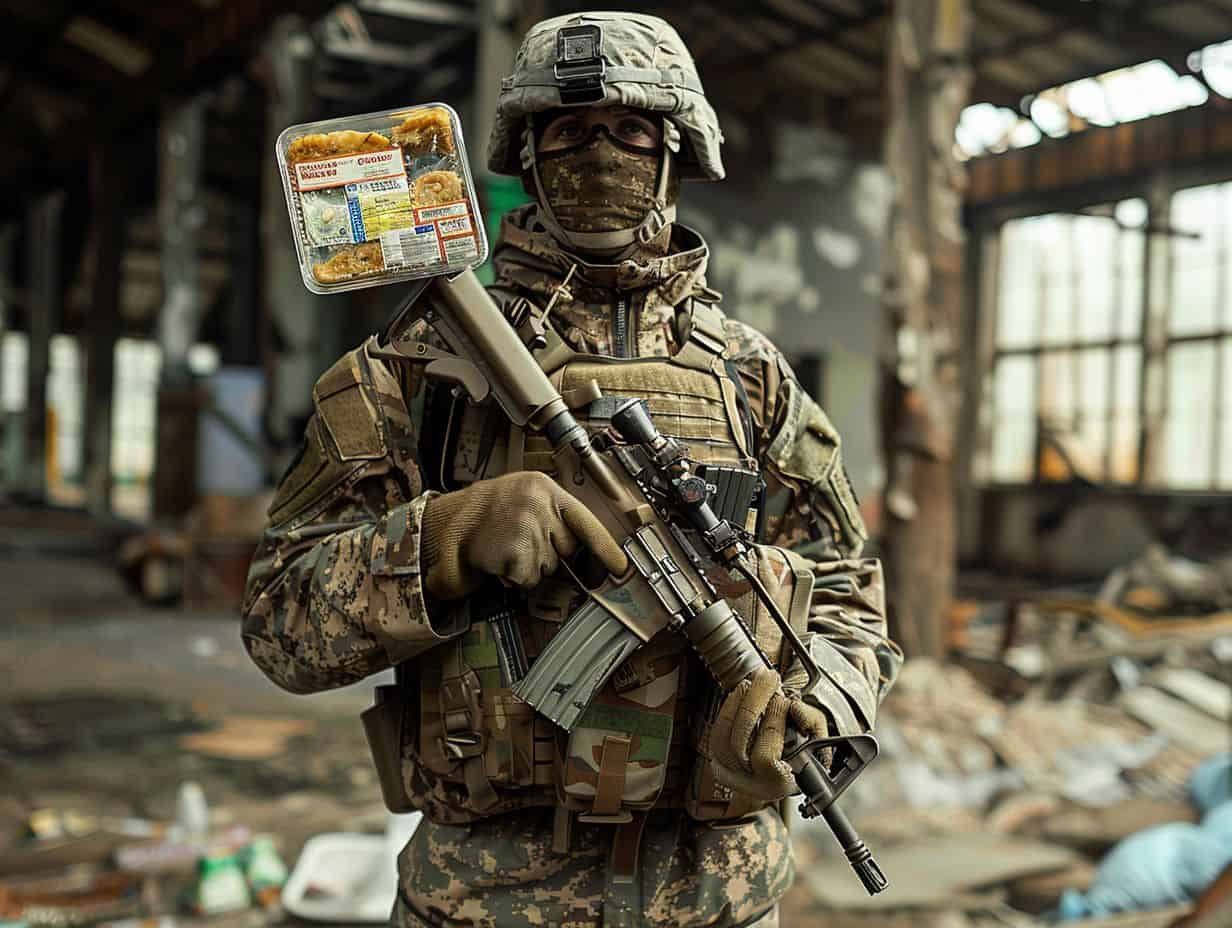Soldiers encounter distinct nutritional challenges while on duty, making it important for them to grasp the concept of Tactical Nutrition for enhancing their performance.
A crucial aspect of Tactical Nutrition involves the utilization of MREs (Meals Ready-to-Eat), which are specially formulated to cater to the unique requirements of soldiers.
This article delves into the significance of nutrition for soldiers, the creation and constituents of MREs, their advantages in maintaining energy levels and facilitating recovery, along with suggestions for integrating them into a soldier’s dietary regimen.
What is Tactical Nutrition?
Nutrition plays a critical role in optimizing soldier performance and combat readiness. It focuses on providing the appropriate balance of nutrients to enhance energy levels, meet caloric needs, and improve overall health and performance in military operations.
By customizing the diets of military personnel based on their specific roles and operational requirements, nutrition ensures that soldiers receive the necessary nutrients to sustain prolonged physical exertion and mental agility in intense combat situations. Macronutrients such as proteins, carbohydrates, and fats are carefully considered to support muscle function, endurance, and cognitive sharpness. Micronutrients like vitamins and minerals play a crucial role in boosting immunity and speeding up recovery from injuries, promoting soldier resilience in challenging environments.
Why is Nutrition Important for Soldiers?
Nutrition is crucial for soldiers as it directly impacts their performance, combat readiness, and overall health. Tactical Nutrition aims to ensure that soldiers receive the necessary macronutrients, micronutrients, and dietary components to sustain physical endurance and mental focus during military operations.
Through a tailored approach to nutrition, Tactical Nutrition addresses the unique dietary needs of soldiers facing demanding situations in the field. Adequate intake of proteins, carbohydrates, fats, vitamins, and minerals plays a critical role in supporting optimal physical performance and cognitive function for soldiers engaged in combat scenarios.
The strategic implementation of nutrition plans not only enhances energy levels but also contributes to faster recovery, improved immune function, and better decision-making skills under stress. Therefore, by emphasizing nutrition, military units can significantly enhance their overall effectiveness and combat readiness.
What are the Unique Nutritional Needs of Soldiers?
Individuals in the military have distinct nutritional needs that call for a strategic approach to address. These needs encompass precise macronutrient ratios, sufficient micronutrient intake, and nutrient-dense meal planning to bolster physical endurance, mental focus, and operational efficiency.
It is vital to meet these specific requirements to ensure that soldiers possess the energy and stamina necessary to endure the challenges of combat situations. Macronutrients such as carbohydrates, proteins, and fats play pivotal roles in supplying energy, facilitating muscle repair, and sustaining overall health. Micronutrients like vitamins and minerals are critical for proper physiological functioning and immune support.
Thoughtful dietary planning is crucial to optimize performance, cognitive function, and reaction times during missions, ultimately enhancing soldier readiness and combat effectiveness on the battlefield.
What are MREs?
MREs, or Meals Ready-to-Eat, are portable meals designed to provide soldiers with convenient and nourishing food options during military operations. These field rations are shelf-stable, pre-packaged meals that offer quick and easy sustenance in combat situations.
They are meticulously crafted to meet the nutritional needs of personnel on the move, ensuring that individuals receive the essential nutrients required for peak performance in challenging environments. The compact packaging of MREs makes them ideal for rapid deployment and consumption, requiring minimal preparation. With a long shelf life, these meals are reliable food choices for extended missions or emergency situations where access to traditional cooking facilities is limited. Their versatility and durability make MREs a crucial component of a soldier’s kit, providing sustenance and energy when it’s needed most.
How are MREs Different from Regular Meals?
MREs are characterized by their emphasis on nutrient density, advanced food technology, and careful meal planning, setting them apart from regular meals. Unlike standard meals, MREs are specifically crafted to fulfill the nutritional requirements of soldiers across various operational settings.
The unique characteristics of MREs ensure that soldiers receive the necessary nutrients, vitamins, and minerals to maintain their energy levels and overall health during demanding missions. The increased nutrient density in MREs allows for efficient packaging without compromising essential dietary needs. The innovative food technologies incorporated in MRE production aid in preserving the meals for extended periods without refrigeration, which is crucial for military personnel serving in remote or challenging environments.
What are the Benefits of MREs for Soldiers?
MREs provide several advantages to soldiers, such as offering a combat diet rich in essential nutrients, reliable survival food options, improved operational efficiency, enhanced combat readiness, sustained physical endurance, and increased mental focus during military engagements.
These pre-packaged meals are specifically crafted to fulfill the nutritional requirements of soldiers in the field, ensuring they have the necessary energy and stamina for demanding missions. By supplying a convenient and easily transportable food source, MREs enable troops to stay fueled and focused without the need for complex meal preparation or access to traditional cooking facilities. This convenience plays a vital role in supporting soldiers’ physical and mental capabilities, enabling them to perform at their peak in demanding and unpredictable environments.
How are MREs Developed and Tested?

The development and testing of MREs involve a rigorous process that integrates food science, nutritional expertise, soldier feedback, training regimen considerations, and the incorporation of essential ration packs and nutritional supplements.
Scientific principles underpin the entire process, ensuring that the MREs are not only convenient but also nutritionally balanced and safe for consumption in various conditions. Nutritional considerations play a crucial role in designing meals that provide the required energy and nutrients for optimal performance.
The feedback mechanisms from soldiers are essential for refining flavors, textures, and overall acceptability of the meals. Aligning the MREs with the soldiers’ training regimens ensures that the meals meet the specific dietary needs during intense physical activities. The inclusion of ration packs and supplements enhances the variety, taste, and nutritional content of these compact, ready-to-eat meals.
What are the Components of MREs?
MREs are composed of various elements, including primary ingredients, essential macronutrients, crucial micronutrients, and specific nutritional values designed to align with the dietary requirements and operational demands of soldiers.
These elements are thoughtfully chosen to offer a well-rounded meal for military personnel across a range of operational settings. The primary ingredients typically encompass proteins like beef, chicken, or tofu, carbohydrates such as rice or pasta, and fats like vegetable oil or peanut butter. The macronutrient makeup ensures soldiers receive sufficient energy for physical and cognitive activities, while micronutrients such as vitamins and minerals promote overall health and immune system function. This comprehensive nutritional profile equips soldiers with the sustenance necessary to uphold energy levels and sustain peak performance during missions.
What are the Main Ingredients in MREs?
The primary components of MREs are meticulously chosen to deliver optimal nutrition, balanced macronutrients, necessary micronutrients, and act as effective meal substitutes for soldiers in active service.
These components are vital in addressing soldiers’ nutritional requirements during military operations. Protein sources like beef, chicken, or tuna in MREs assist in muscle maintenance and development, sustaining soldiers’ physical capabilities. Carbohydrates like rice, pasta, or potatoes provide energy for extended missions. Essential vitamins and minerals such as vitamin C, iron, and calcium promote overall well-being and help combat fatigue. Incorporating fats like nuts or cheese ensures a well-rounded diet, contributing to calorie-rich sustenance crucial for soldiers’ strenuous tasks.
What are the Nutritional Values of MREs?
The nutritional values of MREs are meticulously calculated to meet soldiers’ caloric requirements, maintain optimal macronutrient ratios, ensure nutrient density, and provide convenient ready-to-eat meals that support sustained energy and combat effectiveness.
These meals are structured to deliver a wide range of essential nutrients, including proteins, carbohydrates, and fats in appropriate proportions to fuel the demands of intense military training and operations. Emphasizing portability and simplicity, MREs offer a fast and effective way for soldiers to restore their energy levels and remain nourished during prolonged missions in the field. The nutrient-rich options present in MREs assist in promoting overall health and well-being, contributing to improved performance and resilience in challenging environments.
How Many Calories are in an MRE?
An MRE typically contains a specific number of calories carefully calculated to meet the caloric needs of soldiers, ensure nutrient density, and serve as a complete meal replacement in the field.
These calorie values are meticulously tailored to align with the physical demands of military duties, providing soldiers with the necessary energy to sustain their high activity levels. By offering a balanced combination of macronutrients and essential vitamins and minerals, MREs aim to support soldiers’ overall health and performance. The accuracy in caloric calculation plays a crucial role in optimizing soldier nutrition, ensuring they have the required fuel to maintain peak physical and cognitive functions during missions and training exercises.
How Do MREs Contribute to Soldier Performance?
MREs serve a crucial role in enhancing soldier performance by sustaining physical endurance, facilitating muscle recovery, providing essential nutrition in combat situations, and ensuring sustained energy levels for optimal operational efficiency.
These ready-to-eat meals are carefully crafted to meet the rigorous requirements of soldiers in the field. By offering a well-rounded mix of carbohydrates, proteins, and fats, MREs assist in replenishing energy reserves and repairing muscles after physical exertion. This nutritional support is vital for soldiers encountering strenuous physical demands and prolonged operations, allowing them to remain alert and attentive. The convenience and portability of MREs guarantee that troops can swiftly refuel without sacrificing valuable time during critical missions.
How Do MREs Sustain Energy Levels?

MREs are designed to support energy levels by serving as a performance enhancer through a strategic balance of macronutrients. This balance provides soldiers with sustained energy, mental focus, and a tactical advantage in the field.
The optimized macronutrient composition of MREs ensures that soldiers have the necessary fuel to operate at their peak, whether during periods of intense physical exertion, high-stress situations, or extended missions. By offering a combination of proteins, carbohydrates, and fats in a compact and convenient package, MREs effectively contribute to soldier readiness and effectiveness. This well-rounded nutritional profile not only sustains energy levels for extended periods but also enhances alertness and cognitive sharpness, enabling military personnel to stay focused and responsive in challenging operational environments.
How Do MREs Help with Recovery and Muscle Building?
MREs assist in recovery and muscle building by providing essential nutrients, aiding efficient muscle recovery, and aiding combat units and elite forces in maintaining peak physical condition during demanding operations.
They have a critical role in ensuring soldiers receive necessary nutrients to replenish their energy levels and repair muscle tissue after intense physical activity. These ready-to-eat meals are specifically formulated to provide a balanced mix of carbohydrates, proteins, fats, vitamins, and minerals crucial for the body’s recovery process. By addressing soldiers’ nutritional requirements, MREs help speed up muscle repair, improve endurance, and enhance overall physical performance. This tactical advantage not only ensures optimal health but also contributes to peak operational readiness among military personnel.
Are There Any Risks or Side Effects of MRE Consumption?
While MREs are designed to meet soldiers’ nutritional needs, excessive consumption or reliance on them may pose certain risks and side effects related to nutrient intake, soldier health, and dietary variety.
It’s crucial to recognize that MREs, while convenient in the field, may not provide the same level of balanced nutrition as fresh, whole foods. Over-reliance on these packaged meals could lead to deficiencies in essential vitamins and minerals, impacting overall health and performance. Limited variety in MRE options could result in monotony and a lack of diverse nutrients needed for optimal functioning.
To mitigate these risks, soldiers should aim for a balanced diet that incorporates a mix of MREs and fresh food to ensure they receive a wide range of nutrients essential for their well-being.
How Can Soldiers Incorporate MREs into their Diet?
Individuals can successfully integrate MREs into their diet by comprehending proper meal prep techniques, ensuring correct storage practices, and strategically incorporating them to enhance readiness in combat and emergency preparedness in the field.
When using MREs, it is important to prioritize meal variety for a balanced nutritional intake. Individuals should also monitor expiration dates and regularly rotate MRE stock to uphold freshness. Implementing hydration strategies along with MRE consumption is vital for optimal performance in demanding environments. By adopting these practices, individuals can optimize the advantages of MREs for sustained energy and endurance during missions and emergency situations.
How Many MREs Should a Soldier Consume in a Day?
The number of MREs a soldier should consume in a day depends on individual caloric requirements, meal planning considerations, and the availability of shelf-stable food options to sustain energy and nutrition in the field.
Soldiers involved in strenuous military operations need a precise combination of carbohydrates, proteins, and fats to meet their energy needs. Meal planning is essential to ensure soldiers have access to nutritious and convenient food sources while in the field. Given the challenges posed by unpredictable conditions and limited resources, MREs provide a practical solution to meet these needs. By offering a variety of menu options, MREs can accommodate different tastes and dietary preferences, boosting the morale and performance of troops during missions.
What are Some Tips for Properly Storing and Preparing MREs?
Properly storing and preparing MREs is important for maintaining their quality, longevity, and ensuring that individuals benefit from their nutritional value while gaining a tactical advantage during training regimens and operational deployments.
When storing MREs, it is essential to keep them in a cool, dry place away from direct sunlight and extreme temperatures to prevent spoilage. Checking the packaging for any damage or leaks can help preserve freshness. Properly rotating your supply by using the FIFO (first in, first out) method ensures that older MREs are consumed first, reducing waste.
For preparation, carefully following the instructions on the packaging, including using the correct amount of water and allowing the meal to rest for the recommended time, will guarantee that the flavors fully develop and the nutrients are effectively absorbed by the body.
Frequently Asked Questions

What is Tactical Nutrition?
Tactical Nutrition refers to the specific dietary needs and considerations of military personnel, particularly soldiers, to optimize their physical and cognitive performance in combat situations.
How do MREs fit into Tactical Nutrition?
MREs, or Meals Ready to Eat, are prepackaged meals designed for use by soldiers in the field. They are formulated to provide the necessary nutrients and energy for soldiers to sustain their physical and mental capabilities during combat operations.
Are MREs a necessary component of soldier performance?
Yes, MREs are a vital component of soldier performance. In combat situations, soldiers may not have access to traditional food sources, and MREs provide a convenient and reliable way to meet their nutritional needs.
What nutrients are included in MREs?
MREs are designed to provide a balance of carbohydrates, proteins, fats, vitamins, and minerals. They also include electrolytes and other supplements to support hydration and performance.
Do soldiers have a choice in the types of MREs they receive?
Yes, soldiers can choose from a variety of MRE options, including different entrées and side dishes. There are also vegetarian and halal options available to accommodate dietary restrictions.
Can soldiers rely solely on MREs for their nutritional needs?
While MREs are designed to provide a complete and balanced meal, they are not intended to replace fresh food sources for extended periods. In prolonged combat situations, soldiers may require additional supplements or rations to meet their dietary needs.


